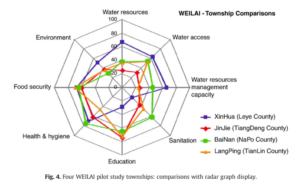Water & poverty in rural China: Developing an instrument to assess the multiple dimensions of water & poverty
 Abstract/Summary: This paper describes the theoretical foundations and development of a multidimensional, water-focused, thematic indicator of rural poverty: The Water, Economy, Investment and Learning Assessment Indicator (WEILAI). The WEILAI approach was specifically designed for application in rural China, to support poverty alleviation project planning, monitoring and evaluation, as well as targeting and prioritization. WEILAI builds primarily on the basic needs framework of poverty alleviation, and on the methodological structure of the Water Poverty Index, to provide a proxy measure of an area’s poverty by assessing eight key poverty sectors, with a strong focus on the components of water-poverty. The WEILAI approach was piloted and implemented in 534 households in China’s mountainous southwest. This paper describes the indicator construction, weighting schemes, methodology, field sites, and statistical validation of the results. In addition, we discuss the results, feedback from in-country project staff, and the likely utility of the tool for project planning, monitoring and evaluation support. The paper concludes with a discussion of WEILAI’s overall utility and ongoing development.
Abstract/Summary: This paper describes the theoretical foundations and development of a multidimensional, water-focused, thematic indicator of rural poverty: The Water, Economy, Investment and Learning Assessment Indicator (WEILAI). The WEILAI approach was specifically designed for application in rural China, to support poverty alleviation project planning, monitoring and evaluation, as well as targeting and prioritization. WEILAI builds primarily on the basic needs framework of poverty alleviation, and on the methodological structure of the Water Poverty Index, to provide a proxy measure of an area’s poverty by assessing eight key poverty sectors, with a strong focus on the components of water-poverty. The WEILAI approach was piloted and implemented in 534 households in China’s mountainous southwest. This paper describes the indicator construction, weighting schemes, methodology, field sites, and statistical validation of the results. In addition, we discuss the results, feedback from in-country project staff, and the likely utility of the tool for project planning, monitoring and evaluation support. The paper concludes with a discussion of WEILAI’s overall utility and ongoing development.
Water & poverty in rural China: Developing an instrument to assess the multiple dimensions of water & poverty
Authors: Cohen, A. & Sullivan, C.
Publication Year: 2010 | Journal / Publisher: Ecological Economics
 Abstract/Summary: This paper describes the theoretical foundations and development of a multidimensional, water-focused, thematic indicator of rural poverty: The Water, Economy, Investment and Learning Assessment Indicator (WEILAI). The WEILAI approach was specifically designed for application in rural China, to support poverty alleviation project planning, monitoring and evaluation, as well as targeting and prioritization. WEILAI builds primarily on the basic needs framework of poverty alleviation, and on the methodological structure of the Water Poverty Index, to provide a proxy measure of an area’s poverty by assessing eight key poverty sectors, with a strong focus on the components of water-poverty. The WEILAI approach was piloted and implemented in 534 households in China’s mountainous southwest. This paper describes the indicator construction, weighting schemes, methodology, field sites, and statistical validation of the results. In addition, we discuss the results, feedback from in-country project staff, and the likely utility of the tool for project planning, monitoring and evaluation support. The paper concludes with a discussion of WEILAI’s overall utility and ongoing development.
Abstract/Summary: This paper describes the theoretical foundations and development of a multidimensional, water-focused, thematic indicator of rural poverty: The Water, Economy, Investment and Learning Assessment Indicator (WEILAI). The WEILAI approach was specifically designed for application in rural China, to support poverty alleviation project planning, monitoring and evaluation, as well as targeting and prioritization. WEILAI builds primarily on the basic needs framework of poverty alleviation, and on the methodological structure of the Water Poverty Index, to provide a proxy measure of an area’s poverty by assessing eight key poverty sectors, with a strong focus on the components of water-poverty. The WEILAI approach was piloted and implemented in 534 households in China’s mountainous southwest. This paper describes the indicator construction, weighting schemes, methodology, field sites, and statistical validation of the results. In addition, we discuss the results, feedback from in-country project staff, and the likely utility of the tool for project planning, monitoring and evaluation support. The paper concludes with a discussion of WEILAI’s overall utility and ongoing development.
PDF on Publisher Website | PDF on OSF
